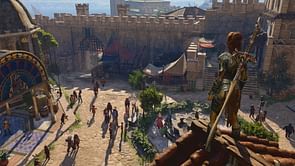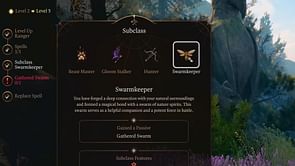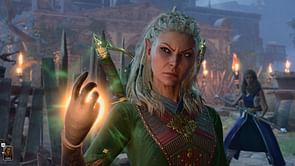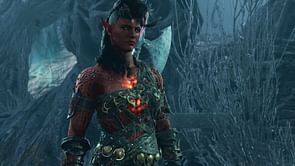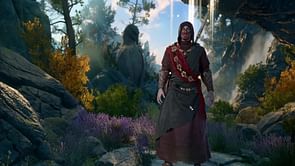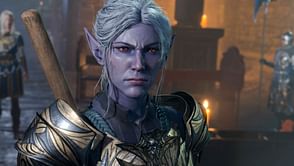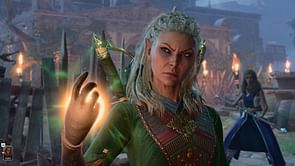
The upcoming Baldur's Gate 3 is already shaping up to be one of the year's top role-playing games thanks to its intricate character creation and solid combat systems. After three years of early access, the full game is scheduled to debut in 2023. In addition, the fantasy series hasn't had a new installment since 2000, so this is definitely one of the games being released in 2023 to keep an eye on.
Baldur's Gate 3’s Plot
The events of Baldur's Gate 3 take place in 1494 DR (Dalereckoning, a system of counting years similar to our calendar's designation of AD). It is set more than 125 years after the events of Baldur's Gate 1 and 2, making it a sequel to those earlier games. Larian has confirmed that there will be connections to both, which should make it simpler for people who haven't played the original games since they were released more than 20 years ago.
According to Larian CEO Swen Vincke "There are returning characters and what happened in BG 1/2/[Throne of Bhaal] leads to what happens in BG3. You won’t necessarily see that at the start of the adventure, but you will quickly understand once you get further into the game."
Following the prologue, Baldur's Gate 3 begins on the highway that connects Baldur's Gate and Elturel. That situates it along the Sword Coast, in the classic Forgotten Realms D&D setting. Though it is not yet present in Baldur's Gate 3's Early Access release, we can assume that we will eventually arrive in the game's titular city. A prequel adventure called Baldur's Gate: Descent into Avernus allows fans of the tabletop aspect of D&D to enter the current setting. Avernus takes place in 1493, only one year prior to the events of Baldur's Gate 3.
Baldur's Gate 3’s Gameplay

As a turned-based game, as opposed to the first two Baldur's Gate games, Baldur's Gate 3 plays somewhat like a hybrid of its own series and the Divinity games from Larian. But that's not a problem as the combat is fluid and simple to manage, as seen in 3's Early Access. This implies that certain abilities, such as magic spells, are more strictly regulated than some players might anticipate and require rests to regain charges.
Players can move around in the game's expansive hub areas to talk to characters, fight enemies, and learn how to use a variety of spells that are both essential to the main plot and incidental. There are numerous potential allies players can recruit to their party, each with a unique personality and backstory that they can learn about, who can play important roles like a support mage or a tanky warrior.
Try it Out:- BG3 Interactive Map
Outside of combat, players are no longer limited to turn-based action and are instead free to roam while using the mouse to point and click to control a character from either an overhead or third-person perspective. Players can interact with a staggering number of NPCs, complete quests, slay monsters, rob people, and pretty much do anything else they want in this responsive world, just like they could in pen-and-paper D&D. Players will make past-tense dialogue choices when conversing with people all over the world, just as if they were recounting their actions to a Dungeon Master. This is, after all, Dungeons and Dragons.
Additionally, skill tests in Baldur's Gate 3 are divided into active and passive checks. The former requires you to roll dice on-screen, flinging a D20 around for crucial dialogue or combat actions. For instance, if you successfully lie to someone during a conversation, a large dice will roll across your monitor. When a check is made by the game without a visible roll, it is called a passive check.
A passive perception check will take place, for instance, to determine whether you are aware of a nearby secret door. Cool, secret door if you do! If not, carry on as if nothing unexpected occurred. The results of passive checks are determined by your overall stats rather than chance.
Baldur's Gate 3 announcement trailer
What platforms will Baldur's Gate 3 be released on?
Baldur's Gate 3 has only been confirmed for the PS5 and PC as the PS5 port will arrive with the game's full release on August 31, 2023. That means there won't be a Switch, an Xbox Series X, or a PS4 or Xbox One version of the game. Even though an Xbox Series X version of Baldur's Gate 3 may potentially happen, it's not ensured and undoubtedly won't be released as soon as the PS5 and PC versions in August.
When will Baldur's Gate 3 be released?
Baldur’s Gate 3 is going to leave Early Access for its full release on August 31, 2023. At The Game Awards 2022, a specific August release date was announced, and Larian founder Swen Vincke said he is "reasonably confident" in the timeline. Larian announced the launch's official date in February as well.
Regardless of hopes for release in 2022, Larian was already laying expectations for a longer wait. A 2023 launch window was confirmed in an early access retrospective video from a D&D Direct event, which urged players to "come along in 2023 when the game releases."

